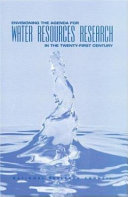

Most ebook files are in PDF format, so you can easily read them using various software such as Foxit Reader or directly on the Google Chrome browser.
Some ebook files are released by publishers in other formats such as .awz, .mobi, .epub, .fb2, etc. You may need to install specific software to read these formats on mobile/PC, such as Calibre.
Please read the tutorial at this link: https://ebookbell.com/faq
We offer FREE conversion to the popular formats you request; however, this may take some time. Therefore, right after payment, please email us, and we will try to provide the service as quickly as possible.
For some exceptional file formats or broken links (if any), please refrain from opening any disputes. Instead, email us first, and we will try to assist within a maximum of 6 hours.
EbookBell Team

4.1
40 reviewsIn this century, the United States will be challenged to provide sufficient quantities of high-quality water to its growing population. Water is a limiting resource for human well-being and social development, and projections of population growth as well as changing social values suggest that demands for this resource will increase significantly. These projections have fueled concerns among the public and water resources professionals alike about the adequacy of future water supplies, the sustainability and restoration of aquatic ecosystems, and the viability of our current water resource research programs and our institutional and physical water resource infrastructures.
With the goal of outlining a roadmap to guide policymakers, the Water Science and Technology Board (WSTB) held a series of discussions at several of its meetings in 1998-2000 about the future of the nation's water resources and the appropriate research needed to achieve their long-term sustainability. From those discussions, the board produced this report, the objectives of which are to:
This report discusses major research questions related to the critical water issues that face the nation. It lays out an interdisciplinary research portfolio for the next 20 years and recommends agenda-setting processes that can maximize the nation's ability to prioritize and conduct water resources research.